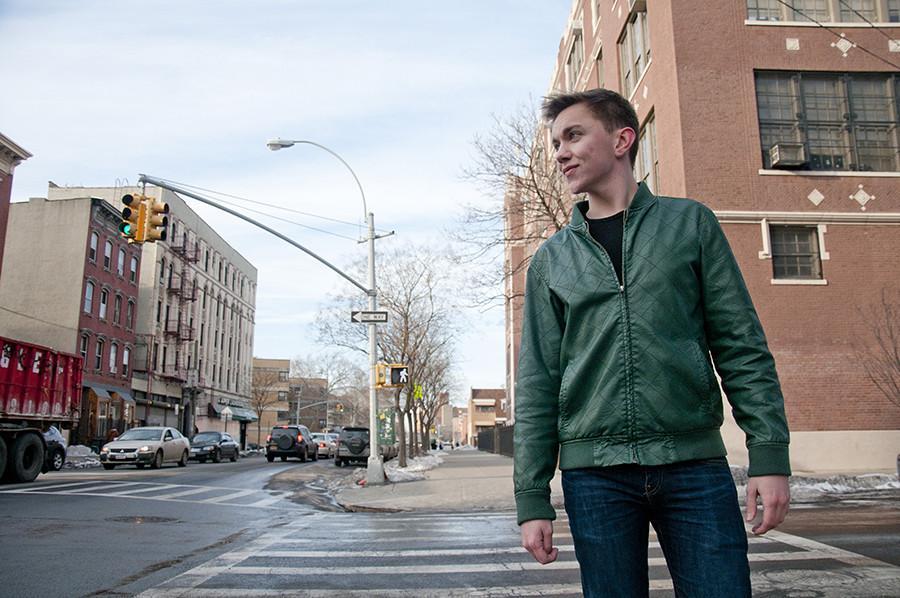Luke Lindenbusch
Luke Lindenbusch is working with the ACLU’s LGBT project on the Supreme Court case with strong potential to legalize same-sex marriage nationwide.
March 12, 2015
Luke Lindenbusch was in eighth grade when he was first called to activism. Proposition 8 had just passed in his home state of California, eliminating the right of same-sex couples to marry.
“It was the first moment when I had recognized that rights had been taken away from me,” Lindenbusch said. “As a gay man growing up in California, understanding that this was something that was going to affect my life and something that I felt a personal responsibility to fight for.”
After the repeal of Proposition 8 in 2012, the scope of Lindenbusch’s interest in activism expanded. Through an internship with the Drug Policy Alliance, he worked for six months on marijuana decriminalization and ending racially biased policing in New York City.
“That sort of opened the door for me in terms of looking at mass incarceration, and looking at prison reform, and looking at racial justice through the lens of political economy, which is what most of my work focuses on now,” Lindenbusch said.
Lindenbusch cites some of his work with the DPA as one of his proudest accomplishments. Last summer, he spent weeks calling elected officials’ offices to gather their support for a rally at City Hall regarding marijuana arrests in New York City.
“Who knows if [Major Bill de Blasio] looked out his window at City Hall and saw the rally happening,” Lindenbusch said. “To think that maybe those few extra ‘yes’s’ that I got might have led to Bill de Blasio saying yes to a policy change is a feeling of accomplishment.”
Lindenbusch recently started working with the American Civil Liberties Union on their LGBT and HIV project, specifically on the Supreme Court case that could potentially achieve marriage equality nationally. For Lindenbusch, this type of work is related to what initially drew him to activism.
“I think that’s what activism is,” Lindenbusch said. “Having the moment when you recognize that something is happening that you fundamentally disagree with, and that only you have the power to change it.”
Lindenbusch, a junior in Gallatin, is concentrating in Political Economy of Postcolonial Urban Development. Lindenbusch’s adviser, Rosalind Fredericks, said his ability to integrate his academic and extracurricular endeavors is perhaps his strongest asset.
“Luke’s time at Gallatin has been an impressive whirlwind of intellectual achievements and extracurricular accomplishments,” Fredericks said. “These intellectual pursuits are complemented by his dedicated social justice work both at NYU and in the wider New York City community.”
Lindenbusch’s involvement in the NYU community is essential to the fulfillment of his goals. He is a coordinating organizer for NYU Divest, where he is currently working on gathering support among faculty to sign a letter to divest the university’s $139 million currently invested in the fossil fuel industry. His involvement in Divest is what inspired his current major project, which fights for NYU’s divestment from the prison industry, including both direct investment and indirect investment through support of the prison-industrial complex.
Even though his work in the NYU community is extensive, Lindenbusch has not lost sight of his principles.
“[I hope to] just be continuing to question the work that I’m doing, question what my next step is, while still remaining committed to the values that I learned growing up and that I also picked up at my time at NYU,” Lindenbusch said.
This summer, Lindenbusch is participating in the Gallatin Fellowship in Urban Practice, and will be living in Berlin while working with a housing advocacy organization. Specifically, Lindenbusch will be interviewing people who feel their housing rights have been diminished, looking at parallels between Berlin and Williamsburg.
“I originally became interested in looking at the ways in which gentrification affects very trendy areas,” Lindenbusch said. “As someone who lives in Williamsburg, I’ve definitely experienced a lot of that friction first hand, and have felt a lot of guilt about it as someone who is not originally from the neighborhood.”
While Lindenbusch acknowledges that the interconnectedness of his endeavors may not be obvious, he said they all strive toward the same end.
“At first glance, it may seem difficult to imagine how my interests are related,” Lindenbusch said. “But the policies that determine the nature of urban spaces and the people who occupy them is, to me, the most telling way to analyze our city and our world.”
• Sam Del Rowe
Video produced by Calvin Falk, Hark Kanwal, Shawn Paik,










































































































































